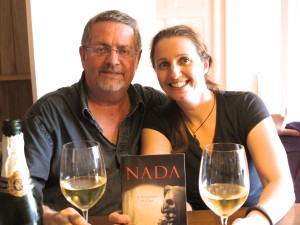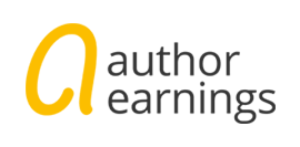OLD POST ALERT! This is an older post and although you might find some useful tips, any technical or publishing information is likely to be out of date. Please click on Start Here on the menu bar above to find links to my most useful articles, videos and podcast. Thanks and happy writing! – Joanna Penn
 One of the inherent parts of being human is a general dissatisfaction with where we are. However much we achieve, we often want more.
One of the inherent parts of being human is a general dissatisfaction with where we are. However much we achieve, we often want more.
This has an evolutionary benefit as it means we are always striving, always creating, always building. But it’s important to recognize your achievements, so whatever you decide you want, you also need to establish how you will measure this success.
I’ve also been thinking about it in the wake of the discussions around the Author Earnings site, which has had the industry blogs all aflutter and brought out the agent and publisher big guns to discuss the impact of self-publishing. Some have said that the report is turning the focus to money, that writing should be about creativity and the rewards are in the work themselves.
But it’s important to remember that we are not a homogenous bunch, and we all strive for different things, for different reasons.
For me, it comes down to three questions:
- What is your definition of success – for this particular book and for your writing career?
- How will you track and measure that success?
- What do you want to do with that success? What is the point in your work?
It will also tend to change over time as your definition of success will be dependent on the progression of your writing career. In this article, I outline some of the more common responses to the question, as well as potential options for measurement.
(1) I want to create something I am proud of and hold my book in my hand
This is perhaps where we all start – with the desire to finish a project and create something tangible. This is also why most first time authors want a printed book.

I helped my 9 year old niece publish her first book, which led her to win national prizes speaking publicly about the experience. I also helped my Dad with his historical thriller, Nada. Neither of these are really commercial prospects, so the focus of success is more on creativity, which is a totally brilliant reason to write a book!
If this is your goal, check out this article on how to self-publish and look at print-on-demand options. If you don’t want to DIY, I would also recommend you read ‘Choosing a self-publishing service,’ by the Alliance of Independent Authors so you can avoid the (ever-increasing) scams in this growing industry.
(2) I want to see my book on the shelves of a bookstore
We have shopped in bookstores all our lives and for many of us, the bookstore is a place of solace as well as adventure. When I was most miserable in my job, I would go to the bookstore at lunchtime and indulge in retail therapy to escape my life for a time. To see a book with our own name on it on those shelves must surely be every authors dream.
This is easy to measure but the truth is that it is extremely difficult to get into bookstores as an independent author. It’s also costly even if you can manage it because of discounting and returns.
 You can definitely do it – as Dean Wesley Smith explains in this article. It’s also possible to build relationships with your local bookstore as Karen Inglis, children’s author, has done. But it’s about where you want to spend your energy, and for me, print distribution is not a major concern.
You can definitely do it – as Dean Wesley Smith explains in this article. It’s also possible to build relationships with your local bookstore as Karen Inglis, children’s author, has done. But it’s about where you want to spend your energy, and for me, print distribution is not a major concern.
I’ll admit that this is still a dream of mine and I’m definitely open to print only deals with traditional publishing, but it is no longer a definition of my success.
(3) I want to reach readers with my words
This is fantastic but I always challenge this definition of success, because it is so intangible. If you want to reach readers, then just put your book out for free and on every platform in the world, as Seth Godin did with ‘The IdeaVirus’ a few years ago. But most people don’t mean this kind of ‘reach.’
So be more specific – does it mean 10 x 5 star reviews on Amazon? Does it mean a fan email from a reader you have never met and who isn’t your friend or family member? Or should you measure this reach in book sales?
(4) I want to sell 10,000 copies of my book/s
This is a better definition than (3) because it is measurable and you know when you get there. The number is obviously dependent on many things: the genre you write in, as a children’s picture book will sell far fewer copies than a commercial romance novel; a literary novel will generally sell less than a commercial thriller. It is also dependent on how many books you have, as you will more easily reach higher figures with more books.
This volume type of definition will also change over time. I started off with 1000 books as a goal when I only had one book. Then I moved to 10,000, and I am just about to crack 100,000 so now my goals have changed again.
(5) I want to win a literary prize and receive literary/critical acclaim
You can achieve this as an independent author. The Alliance of Independent Authors has an Open Up To Indies campaign, which will hopefully mean that more prizes and festivals are open to self-published books over time. There’s also been the recent success of A Naked Singularity by Sergio de la Pava, which started out as self-published and won the PEN/Robert W. Bingham prize and has been shortlisted for the Folio prize.
But you’re still far more likely to win a literary prize if you go through the traditional publishing route. It’s the goal of most MFA programs to produce books capable of winning prizes. As for critical acclaim, again, you’re more likely to get that through traditional publishing and reviews in literary journals.
If this is your goal, you should also be aware of recent research that shows literary prizes can make the book less popular. So this definition of success may be incompatible with making a full-time living as an author.
(6) I want to make a full-time living with my writing
Again, I challenge this because the definition of ‘full-time living‘ is different by country, even by region, as well as the huge difference between income needs from a family with kids to a professional couple or single writer. Try and be specific about the actual figure you are aiming for, and think about how that may grow over time, based on how much you are writing over the next few years, as well as your own financial requirements.
 Then have a look at the Author Earnings website to see if your genre is likely to earn that kind of money. Follow authors like HM Ward, Hugh Howey, Joe Konrath, Barry Eisler, CJ Lyons, Bob Mayer, Dean Wesley Smith and Kristine Kathryn Rusch who all make a great living writing books. Study how they write, how they run their creative businesses and their recommendations.
Then have a look at the Author Earnings website to see if your genre is likely to earn that kind of money. Follow authors like HM Ward, Hugh Howey, Joe Konrath, Barry Eisler, CJ Lyons, Bob Mayer, Dean Wesley Smith and Kristine Kathryn Rusch who all make a great living writing books. Study how they write, how they run their creative businesses and their recommendations.
Making a full-time living became my goal in 2009, and in September 2011, I left my job as an IT consultant to become a full-time author-entrepreneur. I make about one third of the income I used to make back then, but downsizing, paying off debt and changing my own definition of what a ‘full-time income‘ was meant that I could leave the job I hated and start this new creative life.
An income goal is not necessary for everyone, and for many, creativity alone is the reward.
But I have been challenged on my own focus so I have been thinking about it a lot recently. My desire to earn (very) good money stems from my upbringing by a single Mum who worked long hours to provide for me and my brother. I am married, but my financial independence as a woman is incredibly important to me, and I’ve had paying work since I was 14.
My lifestyle is also important, with travel being a part of what I define as a good life rather than ownership of physical

things. Last year I had several weeks cycling through South India, and this year I will be in Canada, Spain or Israel, as well as back in New Zealand. So the ‘why’ behind my definition of success is around my self-esteem as a financially independent woman, as well as wanting to live life on my own terms.
(7) I want to create a body of work I am proud of over my lifetime
This is the definition that will keep you honest about your creative output. You won’t rush a book to publication. You won’t put a book out without a professional edit, or a professional cover. You will strive for the best this particular project can be.
I am trying to balance this with (6) above and it can be difficult. Part of me wants to learn to write faster and produce more words, but my books are characterized by deep research and a sense of place, both of which require a longer writing process. I also want to live a life of research and travel so I want to honor that part of my process.
In the end, I want to write for the rest of my life, hopefully another 50 years, so I’m in this for the long haul. How about you?
I want to hear from you on this important topic. What is your definition of success? How has it changed as your writing has progressed? Who are your role models for success? Please leave a comment below and join the discussion.
Top image: Flickr Creative Commons Clouds by Jonathan Kos-Read


Hi Joanna. You chose to start out this article with a curious observation:
“One of the inherent parts of being human is a general dissatisfaction with where we are. However much we achieve, we often want more. This has an evolutionary benefit as it means we are always striving, always creating, always building.”
Unfortunately, this has an even larger downside in that we may live our lives never being satisfied, never being fulfilled, always reaching for the promise of “more” in the future, while being blind to the fullness of what is right in front of us in this moment.
As for “success”, right now I would like to place my recent first book in the hands of as many readers as possible, while being remunerated for my work. Having said that, how can I not call it success if my book has has deeply touched even a handful of people?
Hi Steve – I really believe that it is the rare person who ever becomes ‘satisfied’ for more than a few months. The nature of life is change and we have to always be adapting and moving on. We can be happy and live in the moment, but I think it is perfectly human to also see the future and where we want to end up. Celebrate our successes, enjoy where we are now, but also plan for the future and dream a new world.
In my experience so far, I’m satisfied when I don’t worry about how to pay the rent AND do something I consider meaningful, or rewarding. I was satisfied for most of the three years I was working on my PhD (involving research and travel, so yes, that satisfies me), and for the first few months of trying to be an independent author on a sort of startup grant (a German program geared at getting people to be entrepreneurs and self-employed, instead of unemployed. I received money for nine months, to get on my feet, and I wrote while also building on the ESL courses I’d been doing before). I get dissatisfied as soon as the money worries grow too pressing, or the work gets too monotonous…
I read another article recently about this very subject, saying that it was essential to define your goals before you start writing. I think it’s ok to have changing goals. (It’s also fair to say that I’m one of life’s bumblers – I left school at 16, took the first job that was going and worked my way up to the top of that industry. At 16, I didn’t think I would ever be able to afford a car let alone a house, but I had paid off my mortgage by the time I was 40.) It took me four years to write my first novel while working full-time and my goal was, purely and simply, to see if I could finish a novel. It wasn’t for publication. It was for my personal satisfaction. To be honest, it seemed like a bit of a vain ambition. It took me a long time to have the confidence to show it to anyone else, but once I started to get good reactions, I set my next goal: to find an agent. I found an agent, I set my next goal: to get published. That goal didn’t work out with my first book, but it did work out with my second book – not via my agent, but via a competition. (Again, I entered the competition with no expectations, but once I found out my book had been shortlisted, of course I wanted to win!) The best piece of advice I have had recently is that you can’t be in the right place at the right time unless you stick at something (this was from someone who others were heralding as an overnight success, after she’d been quietly working away for 15 years). Defining long-term goals can be off-putting if they seem like impossible dreams. There is also a danger that you may end up feeling as if you have failed personally, when the industry that we are working and reading trends are moving on so quickly. This can be thoroughly demotivating. I find it better to take one step at a time, setting lots of short-term acheivable goals. (Another 5 star review today, thank you very much.)
Hi Joanna,
Good question – what is your definition of success. I came to my own answer of this a few years ago. It’s to live as consistently true to my life purpose as I am able. To live an inspired and inspiring life of purposeful, passionate and playful service, mindful abundance balanced with simplicity and spiritual serenity.
Measuring this is not always easy. A starting place is to keep track of how many different ways I am choosing to express this purpose into the world — how many of my decisions, choices and actions are aligned with this purpose.
For example, I’m in the midst of a 2 book promo for the Spiral of Fulfillment and Life On Purpose book — both writing the books and sharing them with others are consistent with my life purpose. (More on this at: http://www.youtube.com/watch?v=UhmKyqeObxI )
Of course it was nice when Life On Purpose was an award winning finalist in the Self-Help: Motivational division of the Best Books 2007 Awards sponsored by USA News being beaten out by a little book entitled The Secret. But those types of awards are simply a cherry on top of a scrumptious life on purpose.
Thanks for all the work you do to help other authors be known and successful whatever their definition might be.
I admire your ambition. I’m looking forward to your Viking book. I recently finished a novel called A Viking on the Subway. It will be fun for me to see how you approach the subject matter. Great to see a picture of you and Arthur!
This is such a great article. I have let myself off the hook from the pressure of going outside of my comfort zone to promote my work because my primary goal was always just to finish the book itself. I hated self-promotion because I worried it might make me sound prideful and self-aggrandizing, and I didn’t want to have to field that sort of criticism.
Now that I’m close, I’ve found myself so comfortably enthusiastic about the end product that I don’t feel insincere promoting it. It’s a great feeling. I still don’t want to measure my success by the amount of income I (might?) make, though–I want to sell the book to 100 readers who don’t know me. I’d also like to hear at least one person start a discussion on the themes in the novel, because if people are discussing themes then I must have done my job to get the readers thinking.
So right now, finishing isn’t my sole goal anymore. I want to sell to 100 readers, then make up the costs of publishing the book, and then any income on top of that would just be a nice bonus.
My definition of success is when I am happy with what I have written, or when the reader invites my work into their private lives.
I liked this article very much – but do we have to have goals? I like to think that if I DO have a goal it’s the ‘reach’ one – but if it truly was then I would, as you said, have my books free all the time! I’ve done many of the things you’ve mentioned – gained a regular readership of people I’ve never met, sold thousands, and have hundreds of wonderful reviews, but I still don’t think of myself as ‘successful’ because if I had to live on the books I sell I’d be in a homeless hostel! I don’t even know why I write – I just do, and probably write on about 340 of the 365 days in the year. I’ve talked to a few writer friends about this recently, and the answers range from ‘because I thought I was going to make money’ to ‘because it’s a stress reliever’ to ‘because it’s all I’ve ever wanted to do.’ My answer? I don’t know! I think I’ll stop thinking about it and get on with the Christmas novella I’m currently writing – I was just taking a ‘reading email’ break and yours is a blog to which I subscribe!
I like your attitude. I guess my only problem is that even if success isn’t measurable, it’s still success.
I decided in 2010 that my mission statement was that writing should connect me with people, places, and things that excite me.
For money, I’ve got a day/night job that I enjoy most of the time. I’d love to make a good living from my writing. But even more, I love creating crazy stories and meeting creative people, and I’m always up for adventure. So you can’t measure that.
Kris Rusch and Dean Smith differentiate between dreams (big plans) and goals (measurable steps). So I decided to write out my goals and dreams here: http://melissayuaninnes.com/writing-goals-est-2010/
Thank you! I’ve copied these and added a few more in a Trello checklist so I can aim for these goals.
I’ve been a freelance writer since 1993, and have earned my living from my writing and speaking gigs since then.
It was definitely easier to make a decent living writing for magazines than it is from writing books. I’ve focused on books over the past 5 years and still make more income from speaking gigs than I do from book sales.
My goal is to increase the distribution network for my chocolate travel book. I self-published Chocolatour, so marketing has been my biggest challenge. Slowly but surely, progress is being made.
What’s my idea of success? To put it in tangible, achievable, terms. My idea of success is to be in the top 50 paid books on Amazon, for a week or longer.
To earn enough money to travel freely while still comfortably keeping 2 horses, and competing should the desire strike me.
To not worry about either bills or pleasures such as going for a meal out, or an evening in the bars.
Finally, and probably most important to me, is to receive contact from people I have no connection to saying how my work affected them.
From a business standpoint, I want financial freedom. From a psychological standpoint, I want physical freedom to travel and be. From a creative standpoint, I want to know that I’ve touched and affected people, that I’ve helped them in some way.
Jo,
This is SUCH a good post. Well done. It reminds me I really need to work out ways of quantifying my life (in terms of progress / success).
I also should try to find out how many books I have sold – that would be good to know.
When I first dreamed of writing a book my ambition was “to sell enough books to pay for cycling round the world.” It’s very satisfying to have reached that, so I think it’s very helpful for people to set targets and appreciate when they reach them.
Thanks Al – you know I find it hilarious that you don’t know how many books you’ve sold 🙂
Thanks. I needed this.
Hi Joanna! This is a good article. I like your opinion and how you practice them.
Success, to me, means being able to reach my goals. I have reached a lot of goals, and I’ve still got more. Reaching them feels really good. I measure them through how I enjoy the fruits of my own labor. Moreover, I’ve learned a lot from reaching those goals. I started writing short blogs to share my knowledge and experiences. My next goal is to be able to finish the book I’ve been writing during my free time, other than writing blogs. Sometimes I forget or feel unmotivated about that goal. I’m glad I read your article. It motivated me towards that goal. Thank you.
I am often reading very inspirational books and stories. I want to be able to tell myself a story. The way I think about the world seems to be original. I want to both inspire myself and others. I feel that will make me a hero to myself and others.